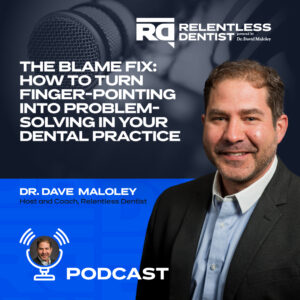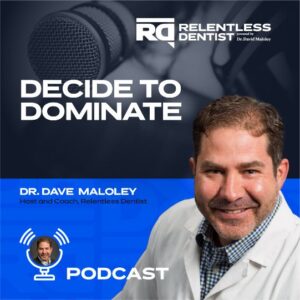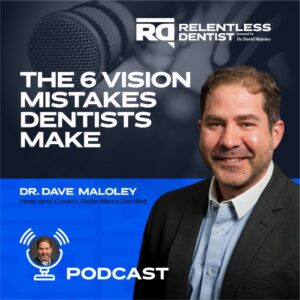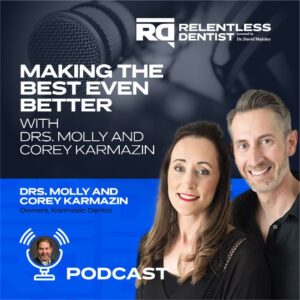by [email protected] | May 8, 2024 | Enhancing Culture
Podcast: Play in new window | Download
 Is your dental team tangled in the typical blame and gossip?
Is your dental team tangled in the typical blame and gossip?
Join us as we unravel the mystery behind why so many dental practices find themselves ensnared below the line and explore the transformative power of ascending to an Above-the-Line Culture.
In this episode, you’ll:
- Uncover Below the Line Dynamics: Explore the reasons behind the prevalence of below-the-line cultures in dental practices and their detrimental impact on practice efficiency.
- Chart Your Path to Above the Line: Follow Dr. Dave as he shares practical steps for cultivating an above-the-line culture, including team training and fostering open discussions.
- Harvest the Benefits: Learn about the tangible benefits of embracing an Above-the-Line Culture, from enhancing patient care to boosting overall job satisfaction among team members.
Don’t miss this enlightening episode filled with strategies to enhance your dental practice dynamics.
Ready to revolutionize your team’s approach and elevate patient experiences? Hit play now!
Are you ready to upgrade your practice? Need help implementing the Dentists Ascend Method? Don’t miss Dr. Dave’s presentation: ‘How to Build a Referral-Centric, High-Profit Dental Practice Without the Team Drama — Even if You’re Currently Overwhelmed.‘ This resource is tailored to help you enhance your operations, boost patient referrals, and increase profits while creating a self-managing team. Perfect for any dental practice owner looking to win in today’s challenging environment. Check it out now!
Key Quotes:
- “It’s imperative that we’re cognizant of where we stand in any moment of time, above the line or below the line, because our position is going to set the tone for the entire team.”
- “Rather than external factors beyond your reach, focus on those [things you can control]. This approach isn’t just about avoiding negative behaviors. It’s about actively cultivating a culture where every team member feels secure, valued, and understood.”
- “Blame is a natural and normal reaction because it comes from our instinctual defense mechanisms…But while blame might offer temporary relief from those uncomfortable feelings, it’s inherently toxic…it creates an environment where fear, defensiveness, and lack of accountability will thrive.”
- “Positive reinforcement will encourage the team to continue engaging in these powerful behaviors.”
- “Gossip…severely undermines trust and disrupts team cohesion…By enforcing a policy where negative topics must only be discussed with those who can contribute to a solution, you encourage direct, candid communication…creating a more positive and productive work environment.”
Featured on the Show:
- People: Jim Dethmer, is a celebrated coach, speaker, and co-founder of The Conscious Leadership Group, known for his work with CEOs and their teams. He leads forums and coach training in major cities and co-authored the bestseller “The 15 Commitments of Conscious Leadership,” focusing on enhancing organizational cultures through conscious leadership principles.
- I appreciate your feedback. Let me know what you learned and loved here: [email protected].


by [email protected] | Jun 30, 2021 | Prescriptions for your Practice
Podcast: Play in new window | Download

Decide to Dominate
Results are going to come from taking action. And all action starts with a decision.
Having to decide on something is naturally hard, most especially if the decision is transformative. However, decisive leadership is vital to effectively execute the plan of action toward achieving the organization’s goals.
This week’s podcast is about creating a culture of decisiveness, how to empower your team to make more and better decisions, the elements that make up a sound decision, and its impact on the organization’s overall well-being. We will also look into the psychology of “learned helplessness” — a situation where people deliberately put out a minimum viable effort to avoid trouble due to a vague instruction from a high-performance-seeking indecisive leader.
Tune in and find solutions to common practice issues at Prescriptions for Your Practice.
Key Quotes:
- “What was the number 1 characteristic of a high-performance culture or a high-performance team? I said immediately, DECISIVENESS.”
- “Decide to dominate. For me, dominate means dominating a day, knowing that we have, as a dental team, control over the day and an opportunity to get better than we were yesterday.”
- “If we’re not decisive, we can expect that our teams will also be indecisive.”
- “If we want results, we need to be decisive.”
- “If a team is consistently making more and better decisions across the board, it’s bound to generate more revenues, more fulfillment, and less stress.”
- “The quicker we make these decisions, the better off we’ll gonna be, the better off the organization is gonna be, and now we start to see the organization reflect the leader and become more decisive.”
- “We need to encourage our people to make mistakes and learn from them.”
- “The best thing you can do for your team is giving them reasons to stay hopeful and optimistic.”
Featured on the Show:


by [email protected] | Jun 16, 2021 | Prescriptions for your Practice
Podcast: Play in new window | Download
 In this episode, I will expound on The 6 Vision Mistakes Dentists Make. I will discuss how crafting a clear vision supports the team’s growth and reinforces the practice effectively.
In this episode, I will expound on The 6 Vision Mistakes Dentists Make. I will discuss how crafting a clear vision supports the team’s growth and reinforces the practice effectively.
More than ever, dentists need to have a well-defined mission and a compelling vision to reinforce their practice, not only for themselves but also for their staff and patients. It provides a clear and consistent direction as to where the practice is going.
Faced with many challenges aggravated by these uncertain times, dentists need to run a successful business to avoid plateaus. One key aspect of strengthening the business is value-creation among the team steered by a well-executed vision. It has to be big enough to fit all of the employees’ dreams and hopes in it.
What does your practice look like five years from now?
Tune in and find solutions to common practice issues at Prescriptions for Your Practice
Key Quotes:
- “It’s important that we have a vision and we execute that properly.”
- “Execution without vision creates friction.”
- “Your vision has to be big enough to fit all of your employees’ dreams and hopes in it.”
- “Being flexible and strategy is important once we define our mission and our vision.”
- “Vision needs to stir excitement and emotion.”
- “We need to evolve as humans.”
- “We need to grow our practice by growing our people.”
- “Make sure that you’re willing to become something much more.”
Featured on the Show:


by [email protected] | Apr 14, 2021 | Legendary Leadership
Podcast: Play in new window | Download

Two of my favorite people in this profession, Dr. Molly Karmazin and Dr. Corey Karmazin, join me on this week’s podcast to unpack their secrets to success. Drs. Corey and Molly are among those featured in my “Dentist On A Mission” book. They practice in a gorgeous, state-of-the-art facility in Sioux Falls, SD alongside a very enthusiastic high-performance team.
Listen in as Drs. Molly and Corey talk about how they made their scratch-start dream a reality, how they continue to reinvest in their practice and refine their leadership style to make the best better. They will also share their insights on culture, systems, and lifelong learning.
Tune in and find more Legendary Leadership
Key Quotes:
- “They said in school, one of the hardest things you can do is probably start your own from scratch. And we were like, let’s do it.”
- “I think with the information overload that we get now, I think it would feel daunting. I’d probably still do it [a startup practice].”
- “We’re always big in putting time and effort back into the team because I think it always pays off in spades.”
- “Sometimes you take it personally when people make a decision to make a change. And I feel like there’s no real substitute for just experiencing that. And I won’t say that it makes you kind of cold, but it makes you realize to really appreciate what you have at any given time and just know like there’s going to be things that are switched out.”
- “Anytime someone leaves, this is always for the better. And then it makes our expectations and levels even higher for the next one and we’re quicker to make decisions whether things are working or not.”
- “The thing that I’ve learned, probably the most in the last couple of years, is we’ve found our voice and it doesn’t have to come off as bossy. And being a leader is telling people what you want and giving them the tools to be able to do that.”
- “We had to invest in technology. We had to computerize the office because I wanted to have a seamless flow from our Sioux Falls office to this office. So it was kind of fun.”
- “I still can’t believe we still have patients that we saw like day one. I felt like I knew nothing. I felt like my skills were there, but they weren’t there where they are now. And you’re just like, Oh, these people saw it in you. And they were like, you can do it.”
- “I think doing it on your own, from the get go, you invest so much more in yourself and the business. Whether it’s with technology or remodel, whether it’s just trying to be on top and up, we just constantly re-investing.”
- Every single patient through the door has either come because they’ve picked up the phone and took a chance on us or they have now told other people. And so, we really do very little advertising. A lot of our patients come from, Hey, so-and-so told me to come see you.”
- “Our confidence in ourselves that we can deliver has made a huge difference.”
- “You don’t know what you don’t know and you think you’re doing a good job and you can do great dentistry forever in that little bubble. It’s just been such a pleasure to burst outside of it and to be able to start different things.”
- “Make connections with dentists all across the country and even the world.”
- “You can’t complain and get angry and bitter when you come from a place of gratitude.”
- “Starting each day with a thing of gratitude, I think, has changed everybody.”
Corey and Molly Karmazin started their dental practice 18 years ago in Sioux Falls, SD. They have embraced continuing education and technology and A-Team atmosphere at their office. Grace, Gratitude and Attitude help make each day at Karmazin Dental a GREAT DAY!
Featured on the Show:


by [email protected] | Mar 24, 2021 | Legendary Leadership
Podcast: Play in new window | Download
 Hiring is complicated. You don’t want to be working with a team who doesn’t embrace and support your goals. Good thing Laura Nelson is there to guide us throughout the process. She recently released a new book, “Hiring without Hesitation: A How-To for Small Business Success” which I am excited to share. I’ve known Laura for a long time, and I admire the honest value she’s bringing to the dental industry.
Hiring is complicated. You don’t want to be working with a team who doesn’t embrace and support your goals. Good thing Laura Nelson is there to guide us throughout the process. She recently released a new book, “Hiring without Hesitation: A How-To for Small Business Success” which I am excited to share. I’ve known Laura for a long time, and I admire the honest value she’s bringing to the dental industry.
Listen in as Laura talks about best practices in hiring the right people for your practice and how to quickly spot a potential rockstar. She also touches on office culture and why you should involve the whole team in the hiring process.
Be inspired and meet more Legendary Leaders
Key Quotes:
- “ It starts with leadership. It really starts with your attitude about hiring. if you think there’s no good people out there, then there’s going to be no good people out there.”
- “You need to have an environment and a culture where people want to come to work there because they’re considering potentially leaving somewhere else maybe, or part-time or whatever to come to you.”
- “If you wait to just hire when you need it, and you’re desperate, you’re gonna hire a square peg and try to put it in a round hole and then you’re going to fail and then you’re going to hit hiring and it’s going to be the cyclical problem that you have.”
- “Always be looking. Don’t rely on just when you need it. ‘Cause if you wait until then it’s going to probably be too late.”
- Let them [team] know that you’re always looking. First of all, it’s going to keep them on their toes. And then second of all, they’re not going to be whispering in the break room going,” Oh my gosh, you know, the [boss] is doing an interview. Who’s he canning? Who is he letting go?” Right? Like it’s just full transparency. So I definitely think involving your team is an important part.”
- “There’s a difference between a job description and a job advertisement. So we need a job description, right? We need a checklist of what are they going to get trained? What are they responsible for and what are they accountable for? But an advertisement is meant to attract.”
- “I’ve had some dental assistants who are amazing at six months and I’ve had some that stink after six years. So, it doesn’t really matter, the amount of experience. So, really going through your job ad and saying, what is required? And then what is nice to have?”
- “ I’ll take personality over experience all day long.”
- “I want somebody to be teachable with experience. That’s the best, that’s the rock star, right? But if they’re not teachable and they’ve got a lot of experience, like you said, they could be stuck.”
- “And again, it ties back to the leadership and the culture. You know, you’ve got to foster a culture, that’s like that, the ability to make mistakes, the ability to learn and grow their ability to take responsibility, to work together as a team for you to be vulnerable for.”
- “You can take a rockstar, put them in a bad culture and kill them. Or you can take an average employee and put them in an amazing culture and make them a rockstar.”
- “Reference checks — and I’ve been guilty of not doing them. You’ve been guilty of not doing them. They are so important. And it’s important.”
Featured on the Show:


 Is your dental team tangled in the typical blame and gossip?
Is your dental team tangled in the typical blame and gossip?





